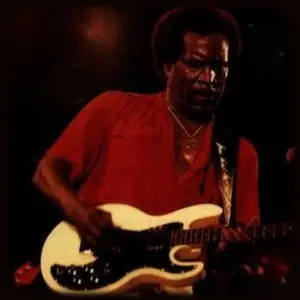JOHNNY COPELAND
 Johnny Copeland had been playing his hard-rocking Texas Blues for thirty years before his Grammy winning collaboration with Albert Collins and Robert Cray on the ‘Showdown!’ album in 1985. This sent his name around the world, and he journeyed abroad himself to bring back some African rhythms to his own compositions. With a big booming voice and an ‘in-your-face’ guitar style, Johnny played a big part in the Blues revival of the 80s.
Johnny Copeland had been playing his hard-rocking Texas Blues for thirty years before his Grammy winning collaboration with Albert Collins and Robert Cray on the ‘Showdown!’ album in 1985. This sent his name around the world, and he journeyed abroad himself to bring back some African rhythms to his own compositions. With a big booming voice and an ‘in-your-face’ guitar style, Johnny played a big part in the Blues revival of the 80s.
In 1937, Johnny Copeland was born to sharecropping parents in Haynesville Louisiana. Johnny’s father died when he was a boy, but he left him a guitar and when the family eventually moved to Houston, Johnny found himself in the same Third Ward neighbourhood as Albert Collins and Johnny ‘Guitar’ Watson, who would all play a part in moving The Blues forward.
‘Dream’ from the “Showdown!” album;
All Johnny’s contemporaries had moved to the West Coast by 1975, but he decided to head for New York instead, where his straight-down-the-line Texas style got him work in the clubs. In 1980, he signed for Rounder Records and his debut album ‘Copeland Special’, showed his powerful voice and dynamic guitar work, winning wide acclaim and a WC Handy Blues Award. Two more Rounder albums and a compilation of his early work were issued before his big breakthrough came with ‘Showdown!’ in 1985. This collaboration with Robert Cray and his old acquaintance Albert Collins, won more Blues Awards and a Grammy, and its worldwide success made the reputations of all three men. Johnny had been one of the first Blues artists to tour Africa, on behalf of the State Department, and he returned there to cut his next record in Nigeria and Ivory Coast, using African and traditional Blues idioms on a pioneering album, ‘Bringing It Back Home’.
Albert jams with Gary Moore at the Montreux Festival;
Further albums and tours kept Johnny busy in the 80s as another Texan, Stevie Ray Vaughan, led a revival of interest in the hard-rocking Blues style. Johnny could also write a Blues song and the lyrics of his compositions bear careful listening as he produced a steady stream of albums, including ‘Jungle Swing’ where he returned to some African rhythms. Unfortunately, Johnny suffered several minor heart attacks because he did not know that he had inherited a congenital heart problem from his father.